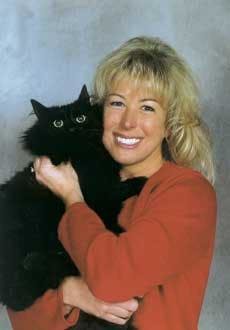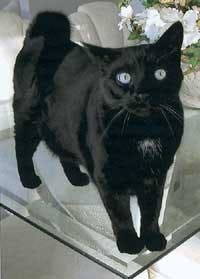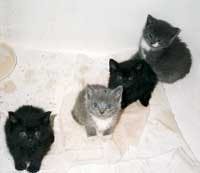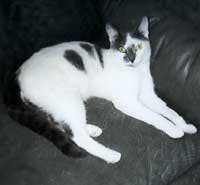by Cathy Hester Seckman, RDH
Bobbi Rae Griffin with Magic, 9 years old, her first rescued cat.
"I was always a dog person," says hygienist Bobbi Rae Griffin. "I grew up with dogs. But one year, in the fall, there was a litter of five black kittens running wild near my apartment. A neighbor and I felt bad about it, so we tried to catch them with rubber gloves and fishing nets. We'd sit out there in the dark, in the cold, and try to catch these kittens, but we never could.
"Winter came, it snowed, and they just dwindled away until only one was left. I put food outside my door.
"The kitten would sit there in a foot of snow, with snow on his head, but he wouldn't come in. Every day I moved the food closer to the door until it was inside. Finally he came all the way in, and I slammed the door behind him. He went crazy. It was six months before I could touch him, but he finally decided to come around and now he's my best cat."
That was nine years ago. The cat thing, Griffin says, "escalated from there. I rescued four cats of my own, and I've rescued 51 other cats and found homes for them. I always said I didn't want people to think of me as the old cat lady, but I'm becoming one."
Besides Magic, the black one, Griffin owns Dustin, 5, who was found by a security guard at the local mall; Mini Me, 1, who looks just like Dustin and follows him everywhere; and Tiffany, 3, a stray Griffin has never been able to touch. "She lives in my house, but she's totally wild. She loves the other cats, though, and I still have hope."
Before cats (and dental hygiene) came into her life, Griffin's main focus was dancing. She studied ballet, tap, and jazz from age 3, then majored in dance at Eastern Michigan University, where she was an EMU dancer at football and basketball games.
Paychex. Found attacked outside with many battle wounds. He had a blood transfusion for a blood parasite caught from a wild animal bite. He was on medicine for six months to suppress immunity. Paychex lives with family friends. He has been Griffin's most expensive endeavor by far, thus the name Paychex.
A few years later, she worked at night while commuting an hour and a half to dental hygiene classes at Lansing Community College. After graduating in 1999, she began working in a general practice three days a week. She also does temp work. "I try to work six days to pay for my cat habit. One cat needed a blood transfusion, and that took about two of my paychecks. Most of my money goes to the cats, although now I'm saving for my wedding."
Troy Emmons, her boyfriend of 13 years, proposed at the top of Mt. Tateyama while they vacationed in Japan last summer. The wedding will be on August 9, and, no, they won't be inviting any cats on the honeymoon. Griffin's mother is her regular cat-sitter.
Griffin feels privileged to have found a man who understands her cat fancy. "He doesn't even ask anymore; he just tags right along with me. He's totally into cats now." If the two hear of a feral litter in the woods, or a cat that was dropped off in someone's neighborhood, they head out with tuna for bait and a live trap.
"Once there was a feral cat near Troy's house, and the live trap didn't work. We finally lured the cat into his garage with food, but the cat climbed up in the engine compartment of his car, and he couldn't drive it for a month.
"Another time I was trying to catch a litter in the woods. I tied an open can of tuna to a string and put it through a fence. I'd wait for them to eat, then I'd pull the string. There were about eight of them, and they came right along after the can, right into the trap."
Once she crawled under a house because she heard mewing noises. "I was on my hands and knees, dragging a purse along. I couldn't grab all the kittens at once, so I dumped everything out of the purse, threw the kittens in there and zipped it up. I was covered with cobwebs, but I was jumping up and down, so happy that I'd gotten all the kittens."
After a cat is safely caught, Griffin takes it to the vet to check for communicable diseases. She pays for vaccinations and neutering or spaying, and sometimes more. "Mini Me had eaten plastic before I found her in a pile of logs, and she had to have surgery."
Another cat had trouble eating. "When I examined her teeth, she had severely inflamed gingiva overgrowing her canine teeth almost to the incisal edge. The vets performed a prophy and decided on a gingivectomy."
Her own cats have their teeth cleaned yearly. "I've observed the vets performing dental work, and they use the exact prophy instruments and Cavitron we use. A few years back, they were having trouble sharpening the instruments and wanted to send them out. I met with the staff and taught them proper sharpening technique. I also volunteer to scale the animals' teeth. There is so much calculus that it's a challenge."
Once the rescued cats are healthy, Griffin brings them home, isolates them from her own cats if necessary, and starts searching for a good home. The longest she's had to keep an extra cat is six months. At times, she says, there will be extra cats in each bedroom, in the basement, and in the utility room. Once she kept four kittens in the bathtub while she bottle-fed them every two hours.
Griffin has gotten so well-known that strangers will call when they've lost a cat or want to adopt one. "All my family and friends have cats now. Two local vets help me out with adoptions."
And there's the photo picture gallery at her office. "I keep pictures of the cats on my shelf. I talk to everyone about them. 'So,' I'll say, 'do you have any pets? Look at the array of cats I have here. They all need good homes.'"
It isn't just cats Griffin will rescue. "I love all animals. I was in Pontiac recently and saw a dog running in the street. I drove all over trying to find him, and even went back that night, but I never found him. I could be a dog rescuer too, but I'd need more property."
It's Griffin's dream to own acreage someday, with a large building that would provide shelter for rescued animals and room for them to play. She doesn't believe in euthanasia unless an animal is sick. "I would do anything in my power to have them treated like kings and queens for their remaining years on earth."
Cathy Hester Seckman, RDH, is a frequent contributor who is based in Calcutta, Ohio. She can be contacted at cseck [email protected].











